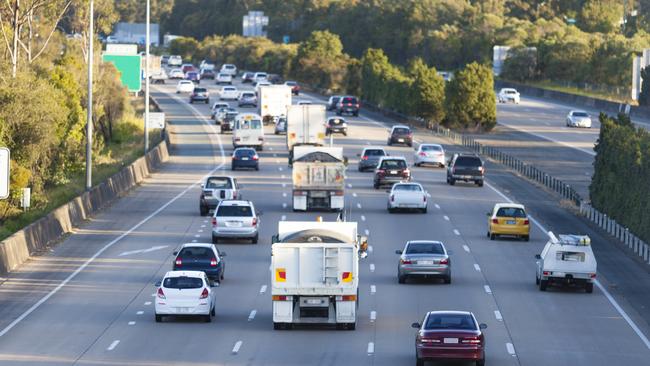Queensland comes under fire for draconian new licence rule that threatens some Australians with $9000 fines
Some Australians are being newly threatened by a rule that could see them cop $9000 fines – causing them to stay off the road altogether.

Motoring News
Don't miss out on the headlines from Motoring News. Followed categories will be added to My News.
EXCLUSIVE
Some Australians are missing medical appointments due to a new driving rule that could see them slapped with a draconian $9000 fine.
In 2022, the Assessing Fitness to Drive standards were covertly changed to include autism as a condition that “should be assessed individually” for the first time.
While that doesn’t mean autistic Australians are disqualified from driving by default, it does mean that, in many jurisdictions, they are required to report their condition and prove it doesn’t impact their road sense.

Each state and territory interprets the driving standards differently, but Queensland took the most hard-line approach. In Queensland, the Department of Transport and Main Roads requires drivers to obtain a medical clearance form from a doctor confirming they are fit to drive despite being autistic.
Failure to do so can result in a $9,288 fine and cancellation of licence.
News.com.au can reveal the change has led several autistic Australians to miss potentially crucial medical appointments over fears they will be fined or lose their licence while driving to them.
“We have received reports from members that appointments at clinics in Queensland have been cancelled this week, following the news of the assessment standards for drivers with autism,” Tegan Carrison, executive director of the Australian Association of Psychologists (AAPi), told news.com.au.
“This is highly concerning because it means people are choosing not to access the supports that exist to increase their capacity and safety.
“Psychologists, as a routine part of their job, assess for risk. If any risks were evident, we would be discussing this with the client and their referring GP to ensure everyone was safe on the road.”

AAPi, which is the peak not-for-profit psychology body in Australia, has written to the Queensland government urging it to scrap the new rule.
In the letter, penned by AAPi chief services officer Amanda Curran, AAPi accused Austroads and other groups involved in writing the standards of holding a “stigmatised” and “discriminatory” view of autism.
The new standards state that autistic people may struggle with “managing attention and distraction, understanding non-verbal communication from other drivers, planning and organisation of the driving task and adapting to unexpected change, sensory sensitivities (e.g. glare and sound), emotional regulation and input overload, repetitive behaviours such as rocking or hand flapping”.
But Ms Curran argued those claims were not based in fact.
“The communication differences that autistic individuals may display are irrelevant when applied to driving,” she wrote.
“The non-verbal communication of drivers is unambiguous and not likely to be misinterpreted, for example. Instances of non-verbal communication while driving are drivers’ use of indicators, traffic signs, and the use of hand signals, which all indicate driving course and direction. Autistic individuals do not typically misinterpret these due to the exact and non-changeable nature of these non-verbal communication methods.
“The mention of self-stimulatory and regulatory behaviour, such as rocking and hand flapping, is also not evident across all autistic individuals.”


AAPi confirmed it was not consulted about the changes to the standards and only became aware of them due to media reports.
“AAPi is concerned that this ruling is discriminatory and may have severe consequences, including stopping people from seeking help or diagnosis,” Ms Curran wrote.
“We want to encourage people to access professional help whenever they need it.”
The body urged Queensland to bring its interpretation in line with those of other jurisdictions, which mostly require autistic Australians to report their condition only if it impacts their driving.

Driving with autism in Australia
The Assessing Fitness to Drive guidelines are interpreted differently across Australia, making for a highly inconsistent system.
While Queensland’s approach is the most extreme, the rules around driving with autism in other parts of Australia are detailed below.
In WA, drivers are required to report any health condition that will have an impact on their driving, and “autism should be disclosed”. Failure to inform the department of a condition that is likely to impair driving can result in a $500 fine.
In Victoria, drivers are required to self-report any long term health condition or disability that has an impact on their ability to drive safely.
In NSW, autistic drivers aren’t required to inform Transport for NSW of their diagnosis, but anyone with a long-term health condition, which may include autism, that affects safe driving is required to self-report.
In SA, autistic drivers aren’t required to disclose their diagnosis automatically, but they are required to report any health condition that may impact their ability to drive. Health professionals have a mandatory obligation to report drivers they deem medically unfit to drive.
In the NT, only drivers with a disability or health condition which affects their driving are required to inform the Registrar of Motor Vehicles. Health professionals have a mandatory obligation to report drivers they deem medically unfit to drive.
In Tasmania, drivers are legally required to report any long-term health condition they have that might impact their driving.
In the ACT, all drivers are legally required to report any long-term health condition or disability that may impair their ability to drive to Access Canberra.
Health consultant Fiona Langdren, who has consulted on the standards for 20 years, noted that autism is not the only condition impacted by them. She said there are many drivers with conditions besides autism who may be unaware of their obligation to self-report.
Originally published as Queensland comes under fire for draconian new licence rule that threatens some Australians with $9000 fines





